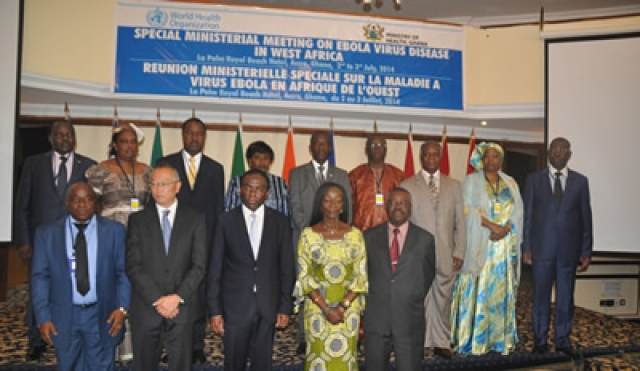Emergency Ministerial Meeting on Ebola opens in Accra, Ghana
 Accra, 2 July 2014 - The WHO Regional Director for Africa, Dr Luis Gomes Sambo, has today re-iterated his call for urgent, collective cross-border, multi-sectoral concrete actions to bring an end to the on-going Ebola virus outbreak in West Africa.
Accra, 2 July 2014 - The WHO Regional Director for Africa, Dr Luis Gomes Sambo, has today re-iterated his call for urgent, collective cross-border, multi-sectoral concrete actions to bring an end to the on-going Ebola virus outbreak in West Africa.
Speaking at the opening session of the Emergency Ministerial meeting on Ebola Virus Disease in Accra, Ghana, the Regional Director urged Health Ministers of the affected countries to leave no stone unturned in their efforts to contain the outbreak. He said: “Your leadership is critical in ensuring that preventive and containment measures are effectively implemented in your countries. To this end, I would like to stress the need to redeploy human resources and reallocate funds to facilitate operations in affected communities”.
The Regional Director observed that the continuing spread of the Ebola virus during this outbreak is to a great extent associated with some cultural practices and traditional beliefs which are contrary to recommended public health preventive measures. In addition, the extensive movement of people within and across borders has facilitated rapid spread of the infection across and within the three countries.
He underscored the critical need to inform, involve and engage community, religious and opinion leaders to be at the forefront of the response efforts as well as improved communication between the Governments, partners and communities in order to generate reliable evidence for implementation of effective and relevant actions. Dr Sambo called also on the research community to address the research gap on Ebola disease prevention and control. He appealed to the leadership of the President of the Republic of Ghana, the current President of the Economic Community of West African States (ECOWAS) to mobilise financial resources to support communities and countries affected by the Ebola virus disease.
Addressing the delegates, Dr Sherry Ayittey, the Minister of Health of Ghana said: “We are here to make a real difference… a difference that will be felt beyond this room for millions of people in dire need for solutions. We have a small window of opportunity to prevent the outbreak of Ebola from spreading further.”
Health Ministers mostly from eleven West African countries, high ranking health officials and international partners are attending the two-day meeting which aims to agree on the best way to interrupt the transmission of the Ebola Virus to reduce the socio-economic impact of the disease and prevent future outbreaks.
The Ebola virus first struck human beings in 1976 in Yambuku, a village in the Democratic Republic of Congo, along the river Ebola. Since then, more than 20 Ebola outbreaks have occurred mainly in East and Central African countries.
In March 2014 Guinea notified WHO about cases of Ebola virus Disease. The cases were initially confined to rural Guinea with the epicenter being Gueckedou. What started as a rural outbreak has now spread to Conakry the capital of Guinea as well as cross border spread into Sierra Leone and Liberia.
The current Ebola outbreak has surpassed all other outbreaks in terms of cases, deaths and geographic spread across Guinea, Liberia and Sierra Leone. As at 1st July 2014, a cumulative total of 750 cases and 455 deaths have been reported in the three affected countries
During the two-day emergency meeting, Ministers of health, technical experts and partners will focus on how best to bring this outbreak under control through surveillance and laboratories; case management and infection prevention and control; logistics and finances; and social mobilization and communication. It is expected that the outcome of the meeting will be the adoption a strategy for accelerated response to contain the Ebola outbreak in West Africa.
____________________________________________
For more information, contact:
Dr Francis Kasolo +242065081101 Email: kasolof [at] who.int
Collins Boakye-Agyemang Tel +233278703731 Email: Boakyeagyemangc [at] who.int
Fadela Chaib Tel: + 41794755556 Email: Chaibf [at] who.int


